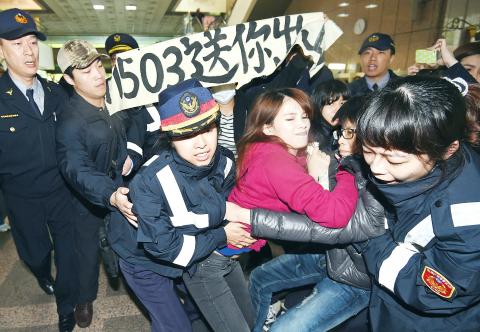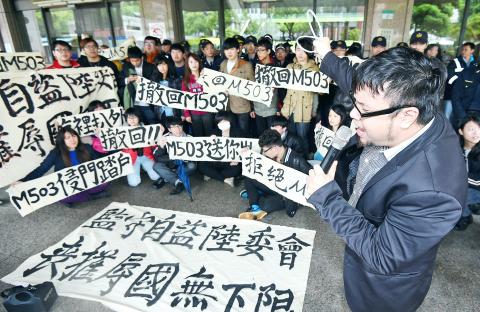About 40 members of the Restoration of Taiwan Social Justice group clashed with police yesterday after staging a surprise protest against a controversial Chinese flight route at the Mainland Affairs Council (MAC) offices, calling on MAC Minister Andrew Hsia (夏立言) to step down.
The M503 flight route — which runs close to the median line of the Taiwan Strait and is scheduled to be inaugurated on Sunday — has come under heavy criticism from many in Taiwan.
Critics say that it could endanger national security and that it circumvents legislative oversight.

Photo: Liao Chen-huei, Taipei Times
The route was an arbitrary announcement by China, the group’s chief executive, Lin Yu-lun (林于倫), said, adding that even after negotiations with President Ma Ying-jeou’s (馬英九) administration, Beijing only agreed to move the flight route westward by 6 nautical miles (11km), placing it 10.2 nautical miles from the median line of the Taiwan Strait.
The route is not an “international civilian route with no flight security risks,” Lin said, adding that it is a Chinese ploy to turn the Taiwan Strait into Chinese territorial waters.
It is difficult to continue to have faith in the council’s slogan touting itself as the gatekeeper of Taiwan in light of the government’s pursuit of China-friendly policies and its acceptance of a policy that seriously undermines Taiwanese sovereignty, Lin said.

Photo: Liao Chen-huei, Taipei Times
Protesters scuffled briefly with police before being forced outside, where they gathered until a council representative accepted a letter of protest.
Lin demanded that the council issue a response no later than today or the group would launch a larger-scale demonstration.
Separately, National Security Bureau Director-General Lee Shying-jow (李翔宙) said that public fears that the People’s Liberation Army Air Force (PLAAF) would conduct regular patrols west of the median line after the M503 route is launched are unfounded.
Having international flight routes close to the median line of the Taiwan Strait means that the PLAAF would keep its patrols even closer to the Chinese coast, giving Taiwan more room in terms of response time, Lee told a meeting of the legislature’s Foreign Affairs and National Defense Committee.
Critics of the M503 route have said the normalization of the route would mean increased PLAAF patrols west of the median line.
Lee said that incidences of Chinese jets breaching the median line were dealt with on a “case-by-case basis.”
Chinese Nationalist Party (KMT) Legislator Lin Yu-fang (林郁方) rejected the claim, saying that since former president Lee Teng-hui (李登輝) sparked tensions by defining the cross-strait relationship as a “special state-to-state” relationship in 1999, the PLAAF has flown 1,100 patrols near the median line each year.
The continued provocation by Chinese jets west of the median line are not “case-by-case” incidents, Lin said, asking Lee whether the M503 route forcing the Chinese jets to retreat from the median line was what he meant by a successful negotiation.
Lee said that since 1999, China has presumably extended patrol parameters from 10 nautical miles from the coast to just west of the median line, adding that there are six to 12, or even 18 to 24, Chinese jets patrolling per day.
With its domestic A470 flight route heavily congested and Beijing agreeing to move the M503 path westward, the world can see that the Chinese have turned what was once combat patrol airspace into international commercial airspace, Lee said.
The westward shift of the PLAAF patrol routes means that Taiwan would gain significant anti-aircraft warning time, Lee said.
Additional reporting by CNA AND AFP

The Ministry of Foreign Affairs (MOFA) yesterday said it is closely monitoring developments in Venezuela, and would continue to cooperate with democratic allies and work together for regional and global security, stability, and prosperity. The remarks came after the US on Saturday launched a series of airstrikes in Venezuela and kidnapped Venezuelan President Nicolas Maduro, who was later flown to New York along with his wife. The pair face US charges related to drug trafficking and alleged cooperation with gangs designated as terrorist organizations. Maduro has denied the allegations. The ministry said that it is closely monitoring the political and economic situation

Conflict with Taiwan could leave China with “massive economic disruption, catastrophic military losses, significant social unrest, and devastating sanctions,” a US think tank said in a report released on Monday. The German Marshall Fund released a report titled If China Attacks Taiwan: The Consequences for China of “Minor Conflict” and “Major War” Scenarios. The report details the “massive” economic, military, social and international costs to China in the event of a minor conflict or major war with Taiwan, estimating that the Chinese People’s Liberation Army (PLA) could sustain losses of more than half of its active-duty ground forces, including 100,000 troops. Understanding Chinese

UNRELENTING: China attempted cyberattacks on Taiwan’s critical infrastructure 2.63 million times per day last year, up from 1.23 million in 2023, the NSB said China’s cyberarmy has long engaged in cyberattacks against Taiwan’s critical infrastructure, employing diverse and evolving tactics, the National Security Bureau (NSB) said yesterday, adding that cyberattacks on critical energy infrastructure last year increased 10-fold compared with the previous year. The NSB yesterday released a report titled Analysis on China’s Cyber Threats to Taiwan’s Critical Infrastructure in 2025, outlining the number of cyberattacks, major tactics and hacker groups. Taiwan’s national intelligence community identified a large number of cybersecurity incidents last year, the bureau said in a statement. China’s cyberarmy last year launched an average of 2.63 million intrusion attempts per day targeting Taiwan’s critical

‘SLICING METHOD’: In the event of a blockade, the China Coast Guard would intercept Taiwanese ships while its navy would seek to deter foreign intervention China’s military drills around Taiwan this week signaled potential strategies to cut the nation off from energy supplies and foreign military assistance, a US think tank report said. The Chinese People’s Liberation Army (PLA) conducted what it called “Justice Mission 2025” exercises from Monday to Tuesday in five maritime zones and airspace around Taiwan, calling them a warning to “Taiwanese independence” forces. In a report released on Wednesday, the Institute for the Study of War said the exercises effectively simulated blocking shipping routes to major port cities, including Kaohsiung, Keelung and Hualien. Taiwan would be highly vulnerable under such a blockade, because it